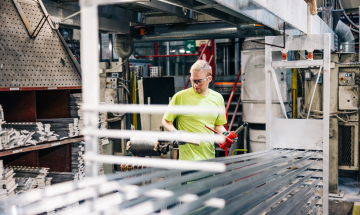
No notable recovery in technology industry, but downward trend seems to have stopped
This information is based on the order book and personnel survey as well as the corona pulse survey conducted by the Federation of Finnish Technology Industries during October.
Almost one third of technology industry companies reported that weak demand is having a major impact on their operations. This figure has remained relatively stable throughout the autumn. Smaller companies are particularly hard hit, while some larger and medium-sized companies managed to increase the number of new orders in the July-September period from the previous quarter.
“As a whole, it can be stated that the downward trend did not continue in the third quarter. However, Finnish technology industry companies will face a difficult situation long into the new year. Companies are also increasingly concerned about 2021 as the rapid progression of the second wave of the pandemic is increasing uncertainty again. Divergence between companies is at an exceptional level,” says Petteri Rautaporras, Chief Economist at the Federation of Finnish Technology Industries.
Order intake a positive surprise, attributable to a few significant successes
In view of all the challenges, the order intake for the third quarter came as a positive surprise, as a few significant successes reversed the trend and the total industry order intake increased from the previous quarter, which was very weak. However, most of the companies reported a drop in orders from the April-June period.
The companies that took part in the Federation of Finnish Technology Industries’ survey of order books reported that the monetary value of new orders between July and September was 8 per cent higher than in the preceding quarter, but 12 per cent lower than in the corresponding period in 2019.
“However, this upward trend so far is attributable to only a few companies. Without these excellent results, the total industry order intake would not have increased much,” Rautaporras points out.
Weak development of the number of requests for tender continued, and the balance figure remained negative. This is a clear indication of continued weak market demand.
At the end of September, the value of order books was 1 per cent lower than in the previous quarter and 4 per cent lower than in the corresponding period in 2019.
Support for business costs urgently required, EU stimulus should be put to good use
The CEO of the Federation of Finnish Technology Industries Jaakko Hirvola is particularly concerned about SMEs, which are hard hit by the coronavirus situation. He feels that the support for business costs that is under preparation should be introduced as soon as possible, and should be available also after the turn of the year. Finland can ill afford a situation where basically healthy businesses fail or are forced to reduce their production capacity significantly. Capacity lost may be irretrievably lost.
“It is important to build faith into the future across the board. Companies expect the weak economic cycle to persist for a long time, which is bad news in terms of investment and recruitment decisions. This is a serious threat,” Hirvola states.
He hopes that politicians can avoid the temptation of pork-barrel politics and allocate the EU stimulus funds to effective green and digital initiatives that promote investment, renewal and exports. Otherwise the stimulus will be a missed opportunity.
It is time to negotiate on wages locally
Minna Helle, Executive Director, Industrial Relations at the Federation of Finnish Technology Industries, considers it crucial that companies make use of the option to agree on wages locally. Based on recent figures, many companies simply cannot afford the 2 per cent wage increase included in collective agreements. There is great need for local agreements and so we face a true acid test for local negotiations.
“Also of concern is that Finnish competitiveness faces a new threat in the coming years as the cost of labour is expected to grow faster in Finland than in many of its competitors. It is important to discuss about companies’ outlook and competitive situation and try to find solutions that help companies to keep up with the international competition” she points out.
Further information:
Jaakko Hirvola, CEO, phone +358 40 063 3751
Minna Helle, Director, Industrial Relations, phone +358 50 341 4884
Petteri Rautaporras, Chief Economist, phone +358 50 304 2220



